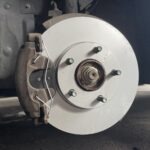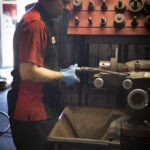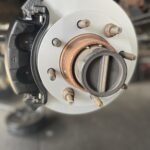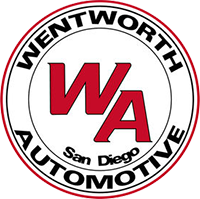Auto Repair
The most important thing is to find someone you feel you can trust. Auto repair shops with a strong culture and happy employees mean they care about every aspect of the business. Happy employees mean they will take better care of you.
- Brake Pads: When brake pads wear down, a squealing or scraping noise is caused from the metal to metal contact. This is a sign that you need to replace the brake pads.
- Brake Rotor: A brake rotor, or brake disc, is a flat, circular metal disc that is mounted directly to the wheel hub or axle. When the driver applies the brakes, the brake pads are squeezed against the brake rotor, causing the vehicle to slow down or stop. Worn, warped, or uneven brake rotors can cause vibrations and noises when the brake pads contact then. Excessively warped or thin rotors should be replaced.
- Contaminated Brake Pads: Things such as dirt, debris, or moisture on the brake pads can lead to noise. Keep the brake system clean.
- Weather: Extreme temperatures of hot or cold, can cause expansion or contraction of the rotor, that will result in noise.
While these are the common reasons, Brake noises of any kind can be a sign of an issue worth checking out. If you hear any sounds, have a qualified mechanic inspect your vehicle. Regular maintenance, proper installation and timely repairs will ensure safe and quiet
brakes. Don’t delay, contact us today for an appointment.

Brake Pads

Brake Resurfacing

Brake Rotor
Reading reviews on Google or Yelp can give you an idea of the quality of service you will get when choosing and Auto Repair Shop. We recommend calling and asking questions. Sometimes speaking to someone directly will build a better relationship than reading online reviews.
ASE stands for The National Institute for Automotive Service Excellence. They are an independent non-profit organization that certifies automotive technicians. Their goal is to improve the quality of vehicle repair and service by testing and certifying automotive professionals.
ASE certified shops show they have a commitment to excellence. They hire and train the best technicians and service advisors to ensure quality and customer satisfaction.
Diesel Repair
Smoke from the tailpipe on a Diesel can be caused by several things. It could be oil leaking into the exhaust, a faulty fuel injector, or coolant leaking into the exhaust. This could be a serious problem. We recommend having it inspected as soon as possible to prevent major damage. (Schedule reservation)
Diesels running rough could be caused by a problem in the high-pressure fuel system such as a faulty fuel injector, a failing sensor, or a high-pressure fuel pump. The high-pressure oil system could also cause a problem. Diagnosis requires specialized scan tools and test equipment, so it is best to have a professional diagnose and repair the problem. (Schedule reservation)
It is important to change the engine oil at least every 7500 miles. If the vehicle is used for towing or other heavy duty uses, we recommend changing the oil every 5000 miles. In diesel engines the oil is used by the fuel system to deliver the high-pressure fuel to the cylinders. Changing the oil regularly can prolong the life of the fuel injectors and other parts of the high-pressure fuel system. It also reduces wear on internal engine parts.
We recommend changing the fuel filter every 15,000 miles on diesels. Dirty fuel can cause premature wear and failure of the fuel injectors.
Hybrid Repair
The batteries will usually last over 10 years and 150,000 – 200,000 miles. Hybrid batteries will start to degrade over time causing them to not charge to full capacity. This will start to cause reduced fuel economy.
Hybrid engines are an internal combustion engine. Changing the oil every 5000 miles for conventional oil and 7500 miles for full synthetic oil is important to prolong the life of your engine.
The Hybrid battery will degrade over time causing it to not charge to full capacity. Since it is not able to provide as much power the vehicle will rely more on the gasoline engine. Since it is working more it will use more fuel. Keeping the tires inflated to the proper pressure is also important.
It is best to take your Hybrid to a professional Hybrid Repair shop. There are high voltage components on the vehicle that, if not handled properly, could cause severe injury.
The short answer is no. The regenerative charging system on hybrids is not connected to the brake pads and rotors. Brakes are very important; we recommend having them replaced by a professional brake repair technician.
Yes, there are special tools required. High voltage meters, safety equipment, and high-performance scan tools are required to properly repair your Hybrid.
Yes, the Air Conditioning system on your hybrid requires a machine that is designed specifically to service your hybrid vehicle. The oil in the AC system must not be conductive. If the incorrect oil is used it can cause severe damage to the hybrid AC system.
Engine Repair
Changing the engine oil is the most important maintenance item on your vehicle. With the additives in oil 3000-mile oil change are a thing of the past. If you use a conventional oil, sometimes called synthetic blend, we recommend oil services every 5000 miles. Full synthetic oil allows you to go 7500 miles between services. Oil can oxidize over time. If you drive less than 7500 miles per year we recommend changing you engine oil at least once per year.
Engines last longer than ever before. It is not uncommon for an engine to last over 200,000 miles. It is important to change the engine oil at regular intervals. If you keep the engine lubricated and cool it should last the life of the vehicle.
Engine repair is labor intensive. A technician can spend 2-3 days on one engine job. The engines we install often have improvements installed that fix known problems with the original engine.
The head gasket is the main engine gasket that mounts the upper portion of the engine (cylinder head) containing the valvetrain. To the lower portion of the engine (crankcase) which contains the crankshaft and pistons.
Spark plugs are made with harder materials like Platinum and Iridium. These allow them to go longer without being replaced. Every manufacturer has a different interval for spark plug replacement. Generally, it’s Copper plugs are 30,000 miles. Platinum plugs at 60,000 miles. Double Platinum plugs at 90,000 miles. Iridium plugs at 110,000 miles.
The term “tune up” has been around for years. On newer vehicles the only thing that is left from the traditional “tune up” is replacing the spark plugs. Upper engine carbon cleaning services are also important to help increase fuel economy. These two items can also prolong the life of the Catalytic Converter as well as reduce Smog emissions.
Wentworth Automotive
Address
7755 Othello Ave.
San Diego, CA 92111
Hours
Mon-Thur: 7:15AM – 6:00pm
Fri-Sun: CLOSED
Phone
(858) 541-1044
